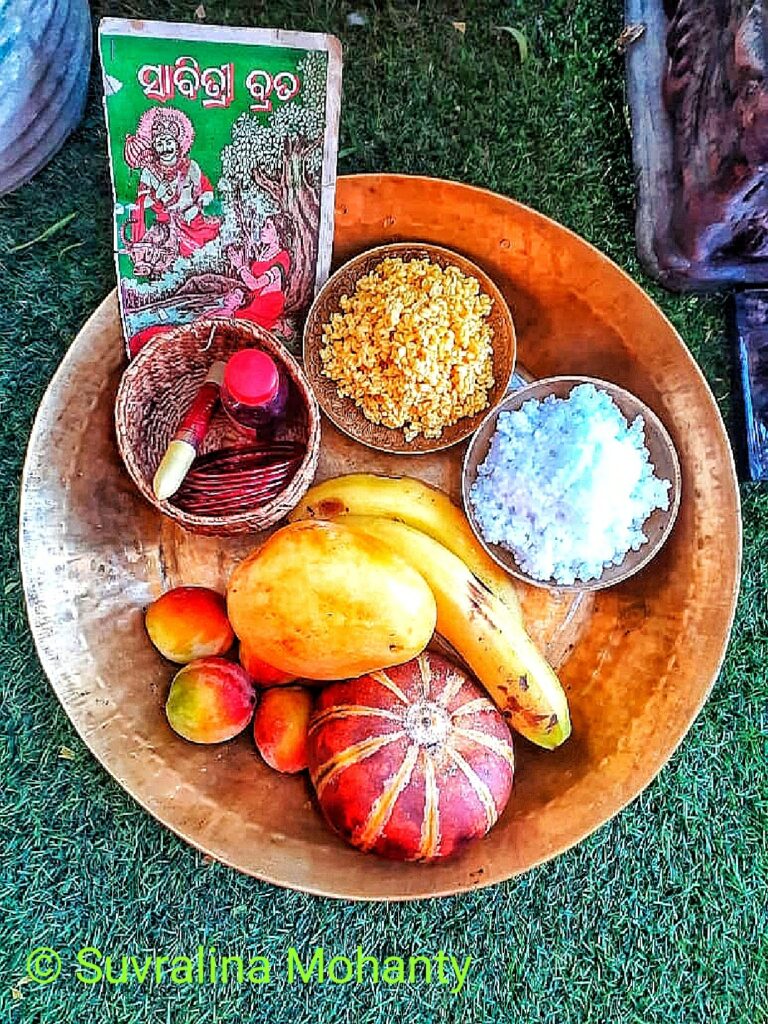Sabitri Brata

Hindu epics mention many interesting encounters of Man with Yama, the bison-mounted God of Death. Some of the loftiest thoughts on the nature of death, the relationship of body with death, the mythical finality of death etc find expression in them. Two of the major faiths of the world- Islam and Christianity- treat death as a long sleep before the final judgement. But Hindus treat death as a change of form of soul- a kind of cosmic uniform change of soul. Stories abound in Hindu mythology about how even Yama Raj, the most Principled of all divinity – Dharma Raj- had to bow before the wit and intelligence of man and surrender the soul He had caught in his noose.
This festival is held in the memory of Sabitri, the Queen of Satyaban, who defeated Yama in a contest of wit and He, being the most Principled, surrendered.
Very briefly, this rivetting story describes how a devoted wife by her power of character, devotion and wit saved her husband from death. When Yama came calling on Satyaban to take him, who was lying on the lap of his most luminous wife, Sabitri, dead, after years of sickness and suffering, Sabitri engaged him in a discourse. Impressed by her knowledge and devotion, it slipped from Yama Raj’s mouth a standard phrase of blessing- Sataputravati Bhava (be a mother of a hundred sons). Sabitri asked how could His blessings come true when He’s taking her husband away. Satyaban came back to life.
All over Odisha and wherever a married Odiani is there, Sabtri Brata (it’s a kind of vow of fasting) day is perhaps the most personally sacred day. She fasts the whole day for the health and happiness of her husband. Wearing a new sari, putting alata, a red liquid around her feet, sindur (vermilion) on her forehead, wrists embraced by many colorful bangles, ornamented with gold or flowers or both, she worships Maa Sabitri, the patron saint of married Odiani.
In many households a woman’s face is made of Amla and turmeric, two petals of tagar flower for eyes and a piece of skin of blackberry for eyeballs. It is pasted on a pestle stone and put on a chair, vertically. It’s decked with a new sari, ornaments and flowers. Then the worship begins. A short book on Sabtri’s life written in rhymes is read aloud. Various kinds of fruits and berries are offered as Bhog.
In the end, the following sloka is read, glorifying her.
ॐ देवासुर मनुष्याणां पूजनीया विधानतः ।
पतिब्रते महाभागे वंदिते च शुचिन्मिते ।।
अवैधव्यन्च सौभाग्यं देहि त्वंमम सुब्रते ।
पुत्र पौत्रं च मोक्षन्च देहि देवी नमोऽस्तुते ।।
सावित्री ब्रह्मगायत्री सत्यवाक् प्रियभाषिणि ।
तेन सत्यन मां त्राहि सद्यः संसारसागरात् ।।
दृढ़ब्रते दृढ़मते ऋतुः सुप्रियभाषिणि ।
अवैधव्यन्च सौभाग्यं देहि त्वं ममसुब्रते ।।
गौरी त्वं हि शची त्वं हि त्वं प्रभा चंद्रमंडले ।
त्वमेव जगतां माता त्वं मां पाहि वरानने ।।
त्रिसंध्यां सर्वभूतानां वंदनियासी सुब्रते ।
मया दत्तामिमां पूजां गृहाणं त्वं नमोऽस्तुते ।।
जन्मया दुष्कृतं किञ्चित् कृतं जन्मशतै रपि ।
भस्मीभवतु तत्सर्वमवैधव्यंच देहि मे ।।

Comments
So empty here ... leave a comment!